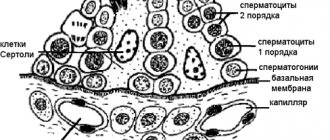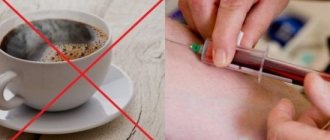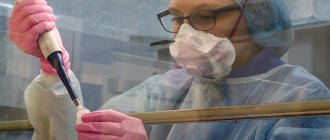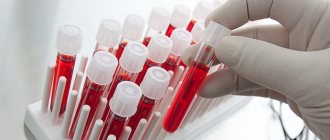Detailed description of the study
Thyroglobulin (TG) is a complex protein (PAS-positive glycoprotein) that fills the thyroid follicles in the form of a colloid. Normally, thyroglobulin is a precursor to the thyroid hormones T4 (thyroxine or tetraiodothyronine) and T3 (triiodothyronine).
Thyroid cells, or thyrocytes, actively take up iodine from the blood, forming a so-called “iodine trap.” As a result of this process, the amount of iodine in the follicles of the thyroid gland is at least 30 times greater than in the blood. With intensive uptake of iodine from the bloodstream, its content in the thyroid gland can increase 250 times compared to the level in the blood. The “iodine trap” stage is stimulated by pituitary thyroid-stimulating hormone (TSH). The higher its value, the more intense the rate of iodine uptake.
Next, the iodine molecule is oxidized. The oxidized microelement interacts with thyroglobulin (with its amino acid residue - tyrosine). This stage is called the organization of TG, as a result of which the main hormones are formed in the follicles of the thyroid gland - T4 (about 93%) and T3 (about 7%), which are secreted into the blood, bind to carrier proteins and are transported to the tissues.
The uniqueness of the thyroid gland as an endocrine organ is that it can maintain a supply of hormones, for example, due to the presence of their precursor, thyroglobulin, in its follicles. One TG contains up to 30 T4 molecules and several T3 molecules. These functional reserves can provide the body with about 2-3 more months.
Normally, a small amount of thyroglobulin can be detected in the blood. An increase in its level is usually associated with a malignant disease - cancer, or carcinoma, of the thyroid gland, especially with one of the highly differentiated types (papillary and follicular cancer). Thyroid carcinoma affects women 4 times more often. The concentration of TG in the above tumors is used as a tumor marker - the content of this prohormone is assessed before and after surgery to remove the gland. After surgery (thyroidectomy), it is advisable to study the dynamics of the decrease in TG in the blood over many months.
The principle of using thyroglobulin as a tumor marker is also based on the fact that the thyroid gland is the only organ that produces TG. Consequently, this protein is not formed outside the gland and can be considered as an indicator specific for its damage.
In rare cases, elevated TG can be detected with an adenoma (benign tumor) of the thyroid gland, as well as with thyroiditis (inflammation of the thyroid gland). For a comprehensive diagnosis of the functional state of the thyroid gland, together with TG, in consultation with a doctor, it may be recommended to take a test for antibodies to TG.
Analysis for thyroglobulin
The thyroid gland is represented by a cluster of spherical follicles, inside of which the complex protein thyroglobulin (TG) is synthesized. If a person is healthy, TG is absent from the analysis results or appears in minimal quantities. A blood test for thyroglobulin has an important diagnostic value for determining pathologies of an endocrine and oncological nature.
It is incorrect to say that thyroglobulin abnormalities detected in the analysis clearly fall into the category of oncopathologies. Nevertheless, when diagnosing thyroid cancer, thyroglobulin is important as a kind of marker after the diagnosis has been made and the patient has undergone treatment. As an independent examination for the initial diagnosis of oncodiagnosis, TG does not make sense. That is, it does not help detect the disease at the initial stage. In this case, it is necessary to undergo a series of diagnostic examinations.
The meaning of a blood test for TG or indications for its implementation:
- monitoring the effectiveness of current treatment of oncological pathologies;
- assessment of the effectiveness of hormone replacement therapy;
- detection of disease relapses;
- diagnosis of thyrotoxicosis, carcinoma, hypothyroidism, thyroiditis.
For effective monitoring after surgery, a TG test can be prescribed six months or a year later, depending on the severity of the previously identified pathology.
Since some of the listed conditions are congenital, the analysis can be relevant for both an adult (male and female) and a child. Gender in this case does not have a direct connection with the frequency of functional disorders of the thyroid gland.
To ensure the accuracy of the results, the patient must properly prepare for the test immediately before the removal of biological material, as well as several days before. Compliance with the rules of preparation is important for patients who have previously been diagnosed with oncology.
Preparing for a thyroglobulin test involves the following rules:
- It is recommended to do the analysis in the morning, since it is between 8 and 10 a.m. that the peak of thyroid hormone activity is observed.
- It is strongly recommended to donate blood on an empty stomach. That is, immediately before the procedure and 8 hours before it, you cannot eat any food. You are only allowed to drink water. Other drinks are prohibited.
- Smoking should be avoided before the procedure, as well as the use of electronic cigarettes and various nicotine substitutes.
- A few days before the analysis, it is necessary to limit the consumption of fatty, spicy and fried foods.
- It is strictly forbidden to consume alcoholic beverages and certain types of medications that affect hematopoiesis. In addition, the intake of iodine-containing drugs and drugs with thyroxine is suspended in advance.
- It is not recommended to take a TG test after diagnostic procedures such as biopsy, computed tomography using contrast, or thyroidectomy.
Based on the specifics of this pathology, a referral for analysis is usually issued by an endocrinologist or oncologist. The research method involves the use of venous blood as a biological material. Blood is withdrawn by a laboratory assistant in a standard manner using a tourniquet and disinfection of the puncture site. Bleeding from the vein is stopped by applying a bandage or sterile cotton wool.
To determine abnormalities in the level of TG in the blood, it is necessary to keep in mind the digital limits, which vary from 1.5 to 59 ng/ml. However, for patients who have undergone treatment for cancer, the boundaries of normal TG levels are somewhat abolished - from 2 to 60 ng/ml. At the same time, the prognosis for future health is most positive if the TG level in the blood is at the lower limit of normal.
It is worth considering that different laboratories may use their own standard limits. Therefore, you should pay attention to the information in the table provided on the laboratory form. As a rule, each individual indicator is prescribed opposite the norm established by the laboratory.
False or inflated indicators without pathological processes in the body appear in the following cases:
- the patient’s body contains large amounts of antibodies to thyroglobulin (antithyroglobulin antibody is a specific agent that reduces the presence of thyroglobulin in the blood);
- taking oral contraceptives containing estrogen, as well as treatment using radioactive iodine, artificially increases the TG level;
- antibodies developed in the patient against cytomegalovirus, Epstein-Barr virus and Toxoplasma parasites can level the level of TG;
- the period of pregnancy in women causes a natural increase in TG levels to varying degrees (no standard boundaries are provided here);
- injury to the thyroid gland (including biopsy) releases the amount of thyroglobulin that enters the blood.
A preliminary interpretation of the analysis result implies deviations of TG from the norm to a greater or lesser extent, which, in turn, means the presence of specific deviations.
Causes of elevated TG:
- tumor processes in the thyroid gland;
- acute autoimmune thyroiditis;
- iodine deficiency, expressed in enlargement of the thyroid gland (endemic goiter);
- nodular formations in the thyroid gland (nodular goiter);
- Graves' disease.
High levels of the hormone should be lowered by eliminating the original cause.
Reasons for low TG:
- decreased functionality of the thyroid gland (hypothyroidism);
- partial or complete removal of the thyroid gland.
You can increase lost hormonal levels by taking medications.
The analysis can be done both on a free government basis and in private clinics. The cost of the procedure in paid medical centers depends on the purpose of the study.
The patient should not panic if the TG level is high. Perhaps it only means an incorrect selection of current drug therapy. Therefore, it is recommended not to decipher the results yourself, but to show them to a qualified specialist.
Since we are talking about the patient’s health, it is necessary to carefully select a laboratory based on the level of the organization and its equipment, as well as the quality of the services provided. The location of the medical facility and the waiting time for results are secondary indicators. However, many modern laboratories have the ability to quickly analyze biological material and provide results in the shortest possible time.
Thyroglobulin (TG) GENERAL RULES FOR PREPARATION FOR STUDIES
Thyroglobulin (TG) is a large protein, a glycoprotein with a molecular weight of 660 kDa, contains iodine, and is part of the colloid of the thyroid follicles. It is a precursor in the synthesis of thyroid hormones - T3 and T4. Being a precursor in the synthesis of these hormones, this protein is a kind and form of their storage. For several weeks, it is also able to ensure the flow of T3 and T4 into the blood. Thyroglobulin is synthesized in the endoplasmic reticulum of thyrocytes and secreted into the lumen of the follicle. Its formation is under the control of the pituitary thyroid-stimulating hormone (TSH). Exposure to TSH leads to increased production of thyroglobulin.
An increase in the concentration of TG in the blood occurs in diseases that occur with a violation of the structure of the thyroid gland or are accompanied by iodine deficiency. An increase in TG concentration is observed in follicular and papillary thyroid carcinomas, diffuse toxic goiter and thyroiditis. A rise in content is possible with benign thyroid adenoma.
It should be taken into account that an increase in the concentration of Thyroglobulin (TG) in the blood with thyroid cancer is observed only in a third of patients. Therefore, currently in laboratory and clinical practice, determination of thyroglobulin (TG) content is recommended mainly for persons undergoing surgery for thyroid cancer and undergoing treatment with radioactive iodine to assess the effectiveness of therapy. A small amount of thyroglobulin can be detected in the blood of most healthy people. Its level in the blood is determined by three main factors:
1) the total mass of differentiated thyroid tissue;
2) the presence of inflammation or damage to the thyroid gland, which causes the release of thyroglobulin into the blood;
3) the amount of stimulating effects on thyroid-stimulating hormone receptors in the thyroid gland (thyroid-stimulating hormone, chorionic hormone or stimulating antibodies to thyroid-stimulating hormone receptors).
– a nonspecific sign of thyroid dysfunction (in most cases benign).
Well-differentiated thyroid cancers in most cases have a favorable prognosis with timely diagnosis of the disease and careful monitoring in the postoperative period. About 85% of patients recover completely after treatment, 15% experience cancer recurrence, and 5% of these have a progressive and severe recurrence. The main laboratory marker of tumor recurrence is the detection of thyroglobulin in the blood.
Special instructions: When initially checking the level of thyroid hormones, you should discontinue medications that affect thyroid function 2-4 weeks before the test (after consultation with your doctor). When monitoring treatment, exclude taking medications on the day of the study and be sure to note this on the referral form (also note information about taking other medications - aspirin, tranquilizers, corticosteroids, oral contraceptives).
GENERAL RULES FOR PREPARATION FOR RESEARCH:
1. For most studies, it is recommended to donate blood in the morning, from 8 to 11 o’clock, on an empty stomach (at least 8 hours must pass between the last meal and blood collection, you can drink water as usual), on the eve of the study, a light dinner with a restriction eating fatty foods. For tests for infections and emergency studies, it is acceptable to donate blood 4-6 hours after the last meal.
2. ATTENTION! Special preparation rules for a number of tests: strictly on an empty stomach, after a 12-14 hour fast, you should donate blood for gastrin-17, lipid profile (total cholesterol, HDL cholesterol, LDL cholesterol, VLDL cholesterol, triglycerides, lipoprotein (a), apolipo-protene A1, apolipoprotein B); The glucose tolerance test is performed in the morning on an empty stomach after 12-16 hours of fasting.
3. On the eve of the study (within 24 hours), avoid alcohol, intense physical activity, and taking medications (in consultation with your doctor).
4. 1-2 hours before donating blood, refrain from smoking, do not drink juice, tea, coffee, you can drink still water. Avoid physical stress (running, quickly climbing stairs), emotional excitement. It is recommended to rest and calm down 15 minutes before donating blood.
5. You should not donate blood for laboratory testing immediately after physiotherapeutic procedures, instrumental examination, X-ray and ultrasound examinations, massage and other medical procedures.6. When monitoring laboratory parameters over time, it is recommended to conduct repeated tests under the same conditions - in the same laboratory, donate blood at the same time of day, etc.
6. Blood for research must be donated before starting to take medications or no earlier than 10–14 days after their discontinuation. To assess the control of the effectiveness of treatment with any drugs, a study should be conducted 7-14 days after the last dose of the drug.
If you are taking medications, be sure to notify your doctor.
Indications for the purpose of the study
1. As a tumor marker for monitoring the treatment of differentiated thyroid carcinomas;
2. Diagnosis of artificial thyrotoxicosis;
3. Study of the etiology of congenital hypothyroidism in children;
4. Assessment of thyroiditis activity, confirmation of thyroiditis in the recent past (up to 2 years);
5. Population studies related to the assessment of iodine deficiency status.





